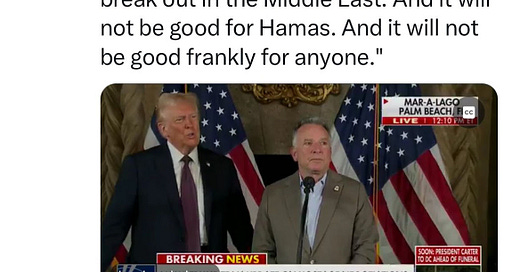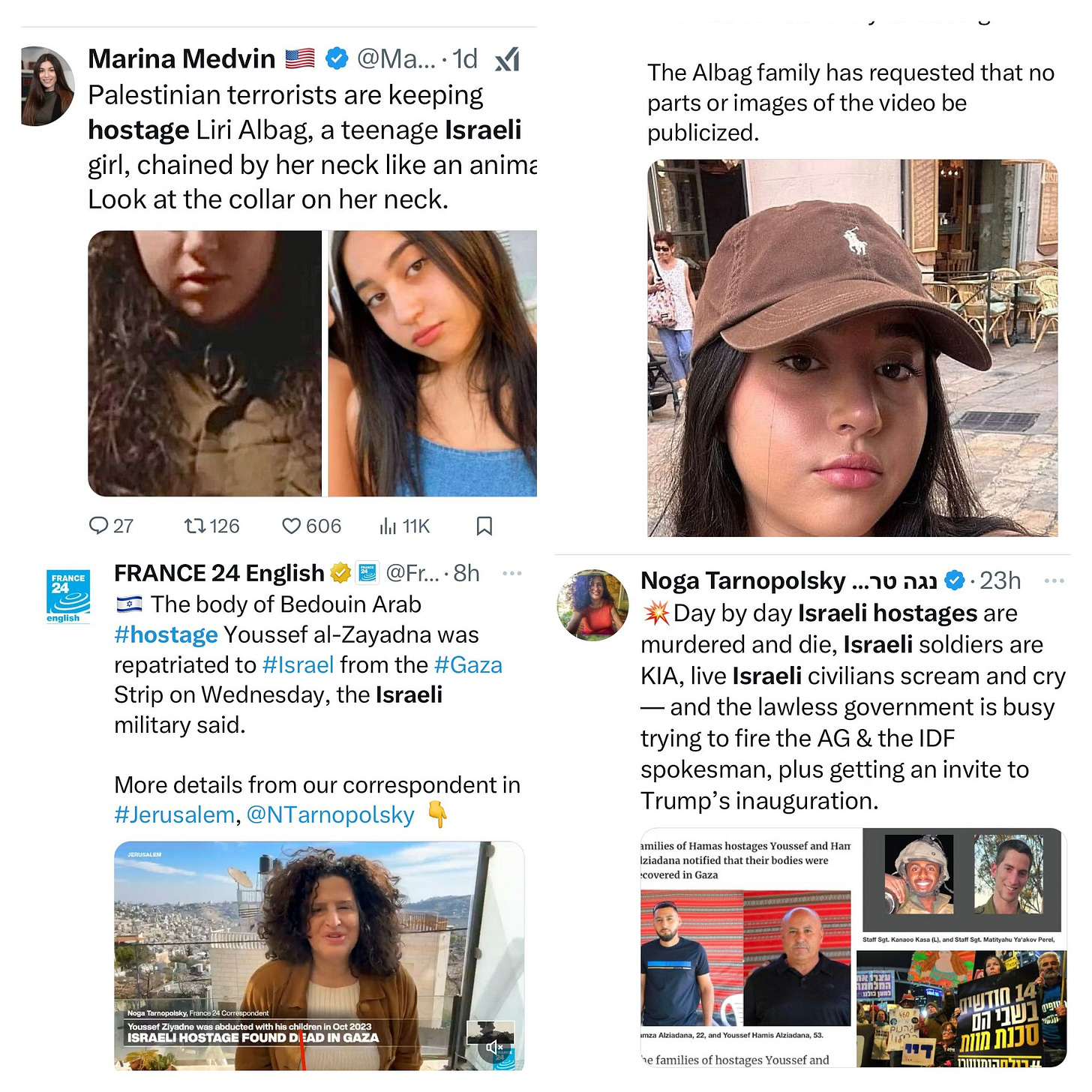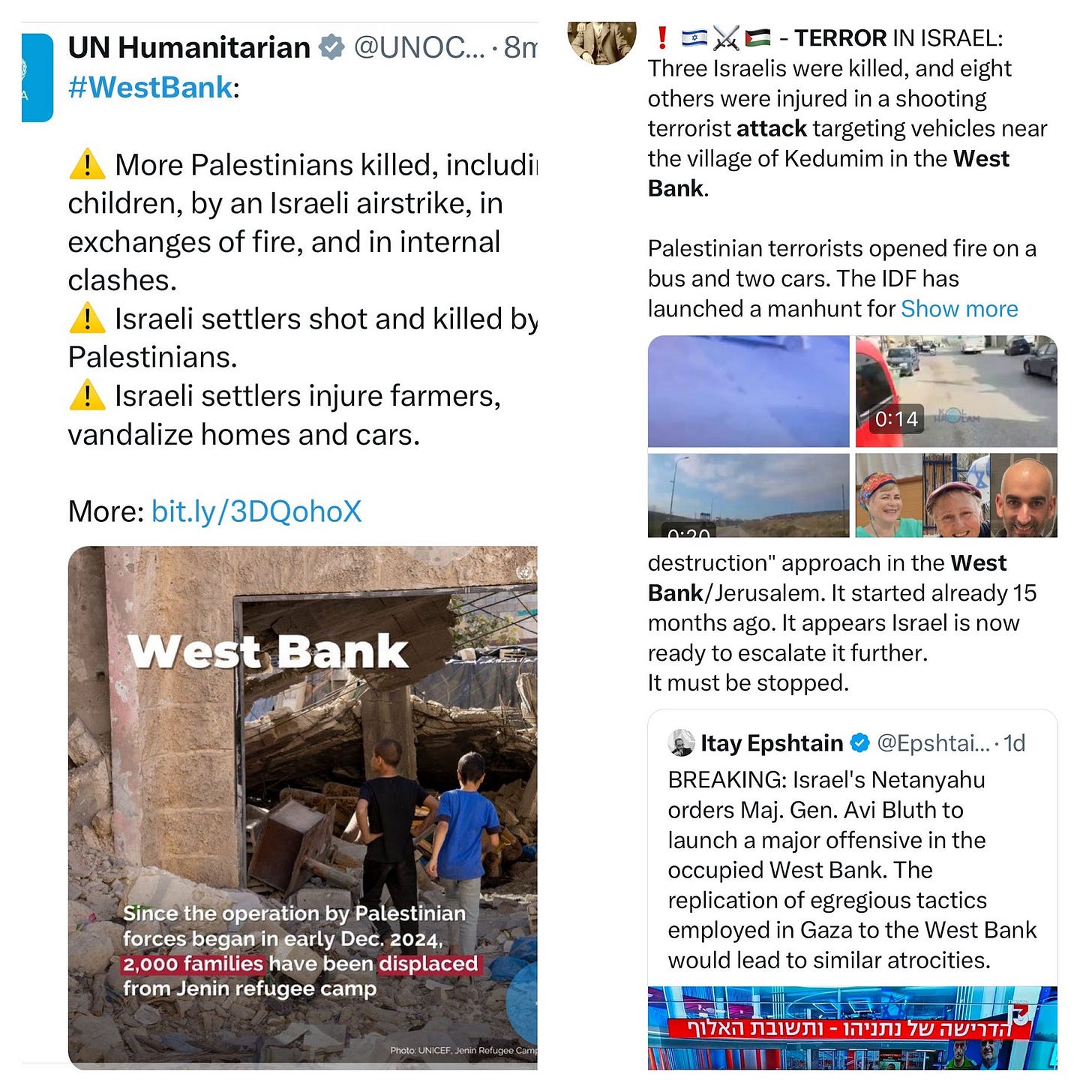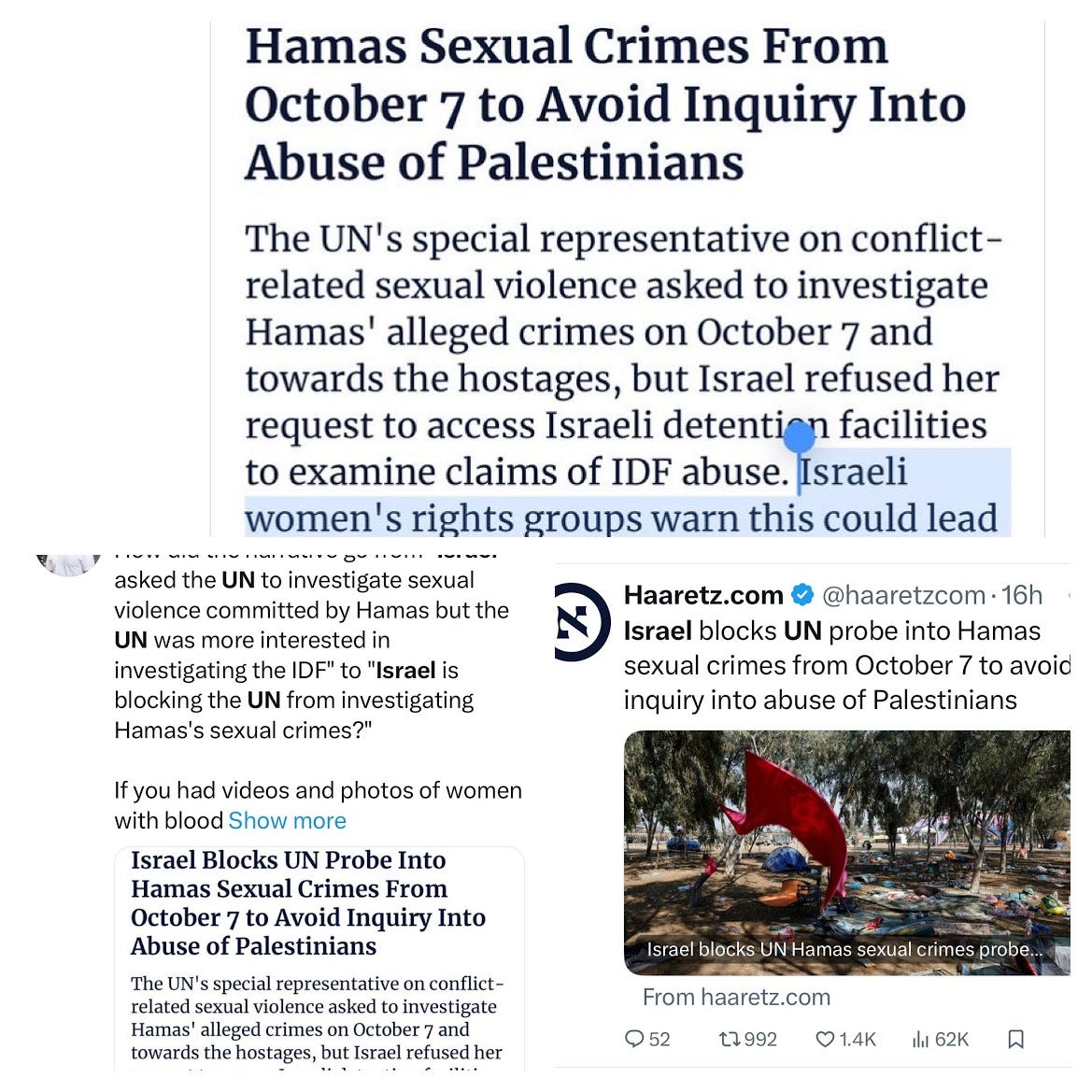Israel at War - Day 462
1. Conflicting Indications On the Hostage Deal Between Israel and Hamas
Senior Israeli representatives are staying in Qatar as part of the negotiations with the mediating parties, Qatar, Egypt, and the US. President-elect, Trump, announced again that if Hamas does not release the hostages, and end the war, then “all hell will break out”. Secretary of State, Anthony Blinken said that the parties are getting close to a deal. On the other hand, Israeli sources say that the parties are still far from a deal.
Earlier this week, Hamas released a list with the names of 34 hostages they agree to release. Later it was revealed that it was the same list that Israel gave Hamas some months ago as the list of the humanitarian cases that should be released in the first phase of the deal. The list of names resulted in controversy, with the families of the hostages rejecting the list and claiming that after 15 months of captivity, all hostages should be considered as humanitarian cases. It is well known that the conditions in which the hostages are held are extremely difficult, they are held underground in tunnels and don’t see daylight for months, they don’t get enough food, don’t have minimal living conditions, have no access to showers, receive no medical aid if needed, some are handcuffed, and some are being tortured. Hamas refuses to reveal who is alive and who is dead among the 98 hostages still held in Gaza and refuses to reveal if the organization knows where all the hostages are kept. Some hostages were taken by random mobs on October 7th, and Hamas has no idea where they are held and if they are still alive. In any case, Hamas agrees to release all the hostages if Israel ends the war, withdraws its forces from Gaza, and releases Palestinian prisoners and detainees from Israeli prisons.
Meanwhile, President-elect, Trump has sent his Middle East adviser to take part in the negotiations in Qatar.
2. Israeli Army Recovered the Bodies of Two Hostages - a Father and Son That Were Taken on October 7th.
Yousef Al-Ziadana, 53, a Beduin who worked at one of the Kibbutzim on the border with the Gaza Strip, was kidnapped on October 7th, 2023, with three of his children who were working with him. Al Ziadna, lived with his family in a Southern Israeli Beduin village. Two of the children, a girl and a boy, were released as part of the only hostage agreement, fifty days after October 7. He and the other son, Hamza, remained captives of Hamas. Their bodies were recovered by Israeli army troops earlier this week. The body of the son Hamza was identified only on Friday. The site also included the bodies of Hamas militants. It seems likely that they were hit by an Israeli bomb some time ago. 98 Israeli hostages are still held captive by Hamas in Gaza.
Earlier this week, Hamas released a video of one of the Israeli soldiers, Liri Albag, 19 years old, one of the five army onservers from the army base on the border that was occupied by Hamas on October 7th. Her family requested that the video not be screened, but agreed to release a still photograph from the video. They said they hardly recognized their daughter. Liri looks terrible as if she is terrorized, scared, pale, and in bad condition. On the other hand, the family has received a sign of life. What she says in the video indicates that it was taken after January 1st, 2025.
3. Escalation in Violence in the West Bank
The security situation in the West Bank remains tense, with recent incidents of escalating violence. Earlier this week, a terror attack targeting Israeli vehicles near the settlement of Kedumim resulted in the deaths of three Jewish Israelis, including two women and one man, while eight others sustained injuries. The Israel Defense Forces (IDF) reported that their personnel are actively pursuing at least two armed Palestinian suspects who fled the scene after opening fire on a bus and private vehicles.
In anticipation of potential retaliatory actions by Jewish settlers, security forces have been deployed to critical friction points throughout the West Bank. Reports indicate that Israeli settlers engaged in stone-throwing at Palestinians near the entrance of a village located less than a mile from the site of the shooting incident.
Far-right national and local leaders have called for a comprehensive military response to what they describe as terror strongholds in the West Bank, drawing parallels with the ongoing conflict in Gaza, which has now entered its sixteenth month. Finance Minister Bezalel Smotrich has expressed the wish that Palestinian towns in the West Bank "should resemble [Gaza's] Jabalya," asserting that Israel cannot rely on the Palestinian Authority to effectively manage security concerns in the region.
During the funeral for two victims of the Kedumim attack, the head of the settlement urged the IDF to implement a "war policy" and to "enter and conquer" Palestinian villages in the vicinity. Additionally, Palestinian health agencies have reported six fatalities among Palestinians, including two children, in the West Bank.
4. A Released Israeli Soldier Had to Flee Brazil Due to an Arrest Warrant Resulting From The War in Gaza
An Israeli traveler, who arrived in Brazil for a long-planned trip in the country, had to flee only five days after he landed. The Israeli foreign ministry discovered that an arrest warrant was issued for him, due to his participation in the war in Gaza as a soldier. The young man was just released from the army and started the planned trip. While in the army, he uploaded some videos of himself in Gaza. The foreign ministry suspect that this arrest warrant was based on warrants from the ICC - the International Criminal Court in the Hague. It is important to mention here that some months ago South Africa filed a petition with the ICC accusing Israel of executing a genocide in Gaza. The prosecutor issued arrest warrants for PM Netanyahu and former minister of defense, Yoav Gallant, who was fired by Netanyahu and later resigned from the Knesset. It was said that the ICC may have also issued other arrest warrants against soldiers, but without publishing their names. Many Israeli soldiers have posted short videos and stories on their social media accounts from their duty in Gaza. Some of those videos reflect wrongdoing, and violations of human rights, present a climate of revenge, and do not necessarily portray professional army behavior. The identification of the soldier was made by a Palestinian organization working to identify Israeli soldiers, based on their own social media accounts.
Many in Israel fear that warrants were issued against every Israeli who took part in the war. The Israeli army has already decided not to reveal the faces of Israeli soldiers above certain ranks in press releases.
5. Israel Reportedly Blocks Further UN Investigation into Hamas’ Sex Crimes
Israeli and international media have reported that Israel is obstructing further investigations led by Pramila Patten, the UN's Special Representative of the Secretary-General on Sexual Violence in Conflict. In a statement, Patten's office reaffirmed its commitment to investigating sexual crimes committed by Hamas during the October 7th attack on Israel, as well as the sexual abuse of hostages held by Hamas.
According to reports, Patten has urged Israel to enter into a framework agreement with her office, akin to the one established with Ukraine, which enabled an investigation into sexual violence attributed to Russia. The media further indicated that Patten has conditioned her request for access to investigate allegations of sexual violence against Palestinian prisoners and detainees by Israeli soldiers on an invitation from the Palestinian Authority. However, Israel has reportedly declined to provide such access.
A comprehensive UN investigation into the sexual crimes of Hamas could potentially result in the organization being added to the UN's blacklist of entities suspected of sexual violence in conflict situations. Israeli women’s rights experts who engaged with Patten in New York and during her visit to Israel last year conveyed to Israeli media that Israel’s refusal to grant access may lead to its inclusion on the UN's blacklist of entities responsible for sexual violence in conflicts, while Hamas might remain unlisted.









